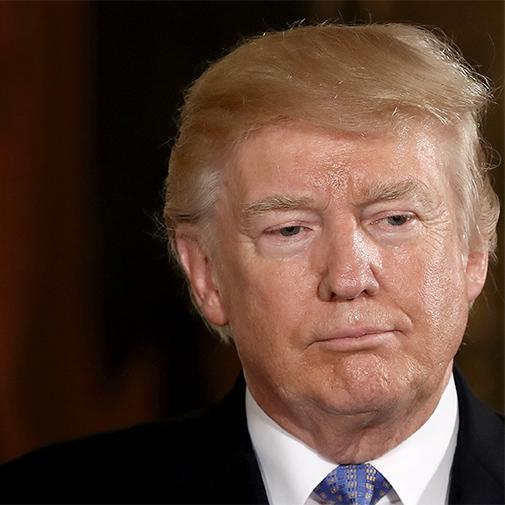On Wednesday, President Donald Trump officially recognized Jerusalem as the capital of Israel.
The President’s decision sets in motion plans to move the U.S. embassy from Tel Aviv to that most holy of cities. But it’s also likely to spark further tension in the region. Some pundits say it will delay or derail the peace process, while others believe it may level the playing field and encourage the two sides come to the negotiating table.
The news was carried by major media outlets worldwide.
“Today, we finally acknowledge the obvious: that Jerusalem is Israel’s capital,” the President said from the White House. “This is nothing more or less than a recognition of reality. It is also the right thing to do. It’s something that has to be done.”
The President’s announcement reverses nearly seven decades of American foreign policy. Since Israel’s founding in 1948, the United States and almost every other nation in the world has declined to recognize Jerusalem as the capital.
That policy, Trump said, has brought us “no closer to a lasting peace agreement between Israel and the Palestinians.” He continued, “It would be folly to assume that repeating the exact same formula would now produce a different or better result.”
Recognizing Jerusalem, he added, was “a long overdue step to advance the peace process.”
The President cautioned that his decision should not be construed as the United States taking a position on whether, or how, the city might ultimately be shared.
The announcement was eagerly received by Israeli Prime Minister Benjamin Netanyahu, who called on other countries to join the United States in recognizing Jerusalem as Israel’s capital. “The President’s decision is an important step toward peace, for there is no peace that doesn't include Jerusalem as the capital of the state of Israel,” Netanyahu said.
Possible blowback
President Trump is reported to have called the leaders of major Arab nations in the region ahead of time to tell them of his decision, including Palestinian Authority President Mahmoud Abbas, Jordanian King Abdullah, Egyptian President Abdel-Fattah al-Sissi and Saudi King Salman.
During his call with Trump, Abbas apparently warned that the action will have “dangerous consequences,” said an Abbas spokesman. He added that “the Palestinian stance is determined and steadfast there will not be a Palestinian state without East Jerusalem as its capital, according to decisions by the international community.”
Jordan’s King Abdullah also warned Trump of the decision's repercussions on Middle East security and stability. He pledged he would thwart any American initiative to renew the peace process and would encourage resistance among Muslims and Christians alike.
Saudi Arabia’s King Salman told Trump that moving the embassy is a dangerous step that will inflame Muslims.
In the West Bank, Fatah, the controlling party of the Palestinian Authority, is said to be preparing for marches and rallies. Other Palestinian factions called for three days of rage in response to the announcement.
At odds
While the President’s announcement fulfills a campaign promise, it also puts him at odds with many international leaders – and not just those most obvious in the Middle East. Many of our allies, including Germany, for example, have expressed serious concerns.
Eight countries have called for an emergency meeting of the United Nations Security Council, including France and the United Kingdom. Additionally, Bolivia, Egypt, Italy, Senegal, Sweden and Uruguay make up the remaining nations requesting that the meeting take place by the end of this week.
But, in his announcement, Trump acknowledged that little progress has been made to advance peace in the region, saying “We are no closer to a lasting peace agreement between Israel and the Palestinians” than two decades ago.
The President’s strategy may not be simply, What have we got to lose? But also: What do we do to strengthen the alliance with our most steadfast ally in the region?
The right thing to do
This is the right thing to do. And the right time to do it.
We decided as a country to recognize Jerusalem as the capital of Israel and to move our embassy there way back in 1995. Since then, for more than 20 years, each President has signed a delay order every six months.
President Trump did not decide to move the embassy. He decided not to sign the delay order any longer. So this is a huge day for America. And I believe it will result in unprecedented blessing for our nation.
Why? Because in the Bible, God says, “I will bless those that bless Israel.”
Jerusalem is clearly important to God. In the gospels, we read of Yeshua (Jesus) weeping for this city. It’s the place where He was crucified, buried and rose again to bring eternal life to those who believe in Him. In Psalm 122:6, we’re asked to pray for the peace of Jerusalem.
A call to prayer
I hope that, as this internationally important news story develops further, you’ll pray for Jerusalem. But please also pray for the Jewish people all across Israel…for their safety and, most of all, their redemption in Jesus.
Thank you for your concern to stay up-to-date on the Middle East. As this situation continues to develop, particularly the responses from Arab nations, we’ll definitely keep you posted.
Thank you also for your friendship with Jewish Voice Ministries. Through your love for God’s Chosen People and your support of this ministry, you are having an eternal impact on lives around the world. From humanitarian aid to the all-important Gospel of Yeshua, your compassion and generosity are transforming lives.












